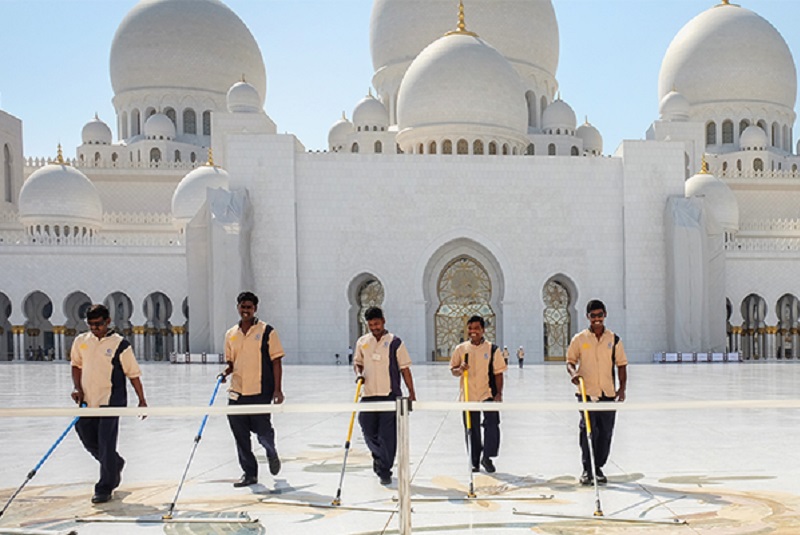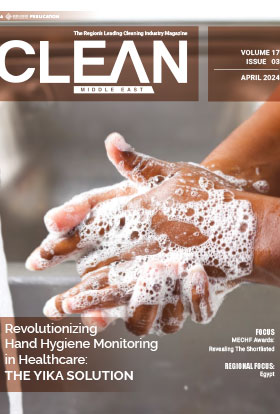
Mosques across the Middle East have been temporarily closed down in wake of Covid 19 - a measure that has been taken by governments to uphold the principles of social distancing and inhibit the spread of the pandemic, which has gripped the world over the last four months.
Why mosques?
- Muslims around the world gather together in mosques for congregational prayers, Quran learning and classes.
- This includes people of all age groups - even senior citizens whose immunity may be quite low.
- Mosques, if not shut, can be a reason for infection breakout.
Major touchpoints to be sterilized in Mosques
- Carpets
- Bookshelves
- Books
- Imam’s podium
- Entrances
- Stairs
Let’s take a look at how mosques in the UAE and Kingdom of Saudi Arabia have been thoroughly cleaned and sterilized:

UAE
Awqaf and Minors Affairs Foundation (AMAF) announced that it will continue the comprehensive sterilization and disinfection drive in the Foundation’s buildings across Dubai, within the framework of the National Sterilization Programme, launched by the UAE Ministry of Health and Prevention and the Ministry of Interior in coordination with the relevant federal and local authorities on March 26, 2020.
In line with the recommendations of the World Health Organization (WHO) and complying with best international practices, the sterilization process will continue periodically as part of nation-wide efforts to prevent the spread of the coronavirus (COVID-19).
His Excellency Ali Al Mutawa, Secretary General of AMAF, said: “Well-aligned with its social responsibility and keenness in prioritizing public health and well-being and as part of its sustained mandate to care for its minors and safeguard its endowments, AMAF is taking all necessary measures to ensure a comprehensive cleansing and sterilization process at its buildings across the emirate.”
The Islamic Affairs and Charitable Activities Department in Dubai has also launched a ‘Community Solidarity Fund against COVID-19’, to help reduce the health, humanitarian, economic and social repercussions of COVID-19 in the emirate.
The Secretary General reaffirmed the commitment of the Foundation to supporting all organizations that are actively involved in combating the threat of COVID-19, most notably the National Emergency Crisis and Disaster Management Authority.
Highlights of the mosque sterilization programme
- 800 mosques have been covered in this sterilisation drive so far.
- Three accredited companies equipped with new technologies are ensuring the success of this mosque sterilization program.
- Latest equipment has been used for spraying disinfectants on major touchpoints like entrances, stairs, the external perimeter, the carpets, shelves and books.
- Carpets, books, shelves and podiums used by imams are being replaced with new furniture which is easier to clean.
- Sterilisation devices have been installed on the doors of the mosques. AWQAF has started sanitising all of its branches, related facilities and Quran centres around the country.
- A number of workshops have been arranged to educate imams on "how to take the necessary precautionary measures to deal with coronavirus, and to educate society on what needs to be done".

Saudi Arabia
The Kingdom of Saudi Arabia is home to the Grand Mosque, which is revered by Muslims across the world. The Hajj to Mecca in Saudi Arabia is considered the world's largest human gathering with almost 7 million people every year. However, the Grand Mosque is no longer abuzz. Infact, it would be apt to say that it is eerily silent as pilgrims are barred from entry as it undergoes sterilisation following the global COVID-19 outbreak.
Here are a few highlights from the sterilization program:
- As many as 4,000 workers have been deployed in cleaning of the Grand Mosque.
- The courtyard and floors of the Grand Mosque are washed and sanitised four times daily to ensure the safety of pilgrims and visitors.
- Disinfectants and environmentally friendly substances in the process.
- 13,500 huge prayer rugs laid out in the mosque are removed before the floors are washed and sterilised.
- Well trained workers are engaged in the cleaning and sterilizing process by using the highly advanced equipment and materials of cleaning and sterilization, in addition to spraying perfumes after it.
- Worshippers find prayer places sterilised and fully cleaned even in courtyards where there are no carpets.
- Efforts have been intensified in terms of cleanliness, arrangement, sweeping and spraying fragrance in all parts of the Holy Mosque.


.jpg)
 Search
Search